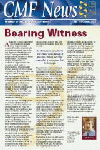Albania was a closed country until 1990. The dictator president Enva Hoxha, who had committed himself to establishing the world's first atheist state, had vowed that Albania would not be free until the last Christian priest had been strangled with the intestines of the last Muslim mullah. Churches and mosques were destroyed and thousands of religious leaders were executed or exiled, whilst he systematically cut off relations with Belgrade, Moscow and China between 1948 and 1980. Their communism was simply not radical enough.
After the revolution in 1990, the people pulled down his statue in Skanderbeg Square. Then followed the pyramid scandal, in which many Albanians lost all their savings, followed by complete civil breakdown resulting in 300,000 fleeing the country. Then the Kosovo crisis with the influx of 500,000 refugees. Now the country is making a painful transition to democracy.
I had the privilege of meeting the first two Albanian Christian medical students at an ICMDA conference in Hungary back in 1996. When we visited Albania last month there were around 50 Christian doctors and medical students in the country, most of them converted from nominal Muslim backgrounds in the last five years. It was humbling to see the vibrancy of their faith and hear their vision for rebuilding their nation.
The Gospel can penetrate into the darkest of situations and bring new life and hope. As Christians we are called to bear witness to this message of the cross - but we need to be aware that it is a message that divides people. Jesus and the apostles were welcomed as the 'fragrance of life' by some and rejected as the 'smell of death' by others,[1] as Albanian Christians, and all others who have suffered in Christ's name, know only too well.
There is evidence that our own post-modern society is becoming more antagonistic to the gospel. This may seem ironical in a culture that prides itself on tolerance and respect; but when we preach Christ as 'the only way'[2] or stand up for Christian values[3] we should expect that there will be opposition. And whilst it must always be our aim to 'explain the hope that we have within us with gentleness and respect',[4] we have to expect that, even then, some opponents will try to silence us, and even use political means to do so.
We have a long way to go to reach the depths of Albania under Hoxha, but over the past few months I have been made aware of three incidents in which opponents have attempted to silence Christian students. In the first (see editorial in July Triple Helix), a Muslim chaplain attempted to have CMF and UCCF banned from all campuses in the UK in the interests of 'religious tolerance'. In the second a university CU were told they could not use university premises for a Christian mission. The third incident involved a CU being banned from campus after a gay student group had complained about 'homophobia'.
The freedom to share our faith and to express our opinions on ethical issues is a fundamental democratic right protected by law (p.4). And like Paul, who sought legal protection on grounds of being a Roman citizen,[5] we may need graciously to remind our opponents of what the law says, and stand up in defence of our junior members and students who are most likely to be victimised.
But even if the law in this country should change, we need to take to heart the example of the apostles, who when forbidden to share their faith, simply declared, 'We must obey God rather than men'.[6] They were acting under higher authority, so simply refused to be intimidated - and also suffered for it.
This autumn's Confident Christianity evangelism training tour (p.4), and the new Ethics for Schools website launched this September (p.3) are two exciting initiatives for getting the Gospel message (and Christian values) more widely heard. Please pray for the success of these ventures, and please join in.
And as we do so, let's remember what a wonderful privilege it is to be carriers of the message of the cross. Let's pray for more opportunities to bear witness to it (and for the courage to take them), and let's also be prepared to count the cost, so that like others can come to know Christ's love and forgiveness, like our new brothers and sisters in Albania.
Peter Saunders CMF General Secretary
1. 2 Corinthians 2:16
2. John 14:6; 1 Timothy 2:15; Acts 4:12
3. John 7:7
4. 1 Peter 3:15
5. Acts 22:25
6. Acts 5:29































